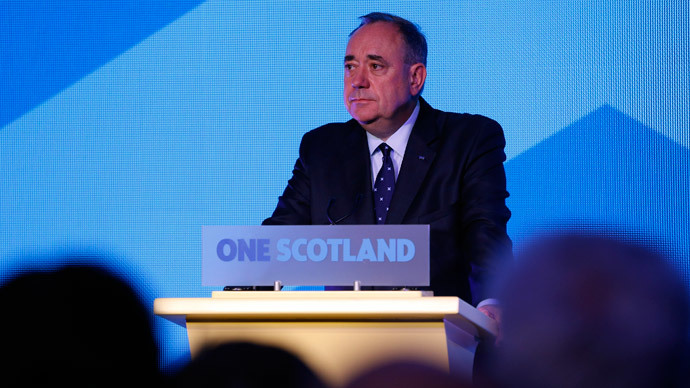‘Scotland to get more powers and still be able to blame Westminster for any problems’

With a NO result in the referendum the Scottish people get the best of both worlds, avoiding the mess of breaking up the union and at the same time getting more autonomy, Rob Lyons, columnist for the UK internet magazine Spiked, told RT.
RT:Alex Salmond said the independence issue should not be brought up for another generation should a NO vote be returned. Will he stick to his words? Will he still be in a position to say such things?
Rob Lyons: I think he is in a very difficult position. If you had offered him what is on the table now at the start of this process, which is expanded devolution for Scotland, he would probably have been very happy with that, it is the question that he wanted on the ballot paper in the first place. He is going to get quite a lot of what he wants as the referendum campaign has been so close.
READ: Scotland votes 'No' to split from UK in independence referendum
RT:What about the YES campaigners - almost half of the population supported independence? Will they now let the issue lie?
RL: I would certainly be expecting that the main UK parties to deliver on these extra powers for the Scottish Parliament. The core of those people will have been genuine independence seeking Scots. Quite a large proportion of them were actually people who were dissatisfied with politics itself or mainstream politics as it exists today. They may be satisfied in a way that this is not really a question for them, what they really want is for a greater recognition of the problems that have been facing, particularly by working class people in the big cities, where there seems to be higher unemployment and where there is little recognition of their political interests in the corridors of power. They will be satisfied much more by the feeling that they are being listened to and the policies are being enacted which reflects their needs.

RT:Do you think Scotland will now get more autonomy within the UK?
RL: That certainly seems to be the way it is going. The solution being offered is that there will be greater tax raising powers for the Scottish Parliament, more freedom to use that tax and greater autonomy on a variety of other issues. Although it’s not exactly clear what the final outcome will be in terms of what powers will be given to the Scottish Parliament. And it does leave open the West Lothian question, the fact that Scottish MPs will still be able to vote on matters that only affect England and Wales, and that’s the really big one in terms of the final democratic settlement that has to be sorted out. I don’t think that the major parties actually have a clear plan for what to do about that.
RT:Some see the referendum as the high point of Alex Salmond's political career. So where does he go from here?
RL: He has got a great platform from which to continue to exercise authority. In some ways it’s a very good result for him because on the one hand, he will get more power, so he will be able to do more within the Scottish Parliament where he does have a majority. On the other hand, he doesn’t have the mess of breaking up the union immediately which would have been a very messy process, and he still gets to blame Westminster for whatever he wants, for any problems that are to arise. So in some ways he has got the best of both worlds, as well as the Scottish people.
RT:Could this vote inspire a spree of similar moves in other parts of Europe?
RL: The situation in other parts of Europe would be a bit different, but it is really striking that the UK which has been historically one of the most stable countries in the world for hundreds of years, for things to get this close to a break up, and I think will encourage other movements. At the same time those movements are a little bit different: Spain is a very specific case because there was a civil war, and is in living memory, but that is still very much an issue there for the countries like Germany and Italy in particular. Italy kind of came together in a very much less equal union in the 1870s and 80s. So those issues are all very specific, very different, but the fact that they came so close in Scotland will certainly inspire the idea that all the countries could break apart and the issue will remain alive. At the same time obviously the fact that Scotland hasn’t voted for independence will probably deflate this bubble a little bit as well.
READ ALSO: Blame neoliberalism, not Salmond, if the UK breaks up
The statements, views and opinions expressed in this column are solely those of the author and do not necessarily represent those of RT.
The statements, views and opinions expressed in this column are solely those of the author and do not necessarily represent those of RT.












